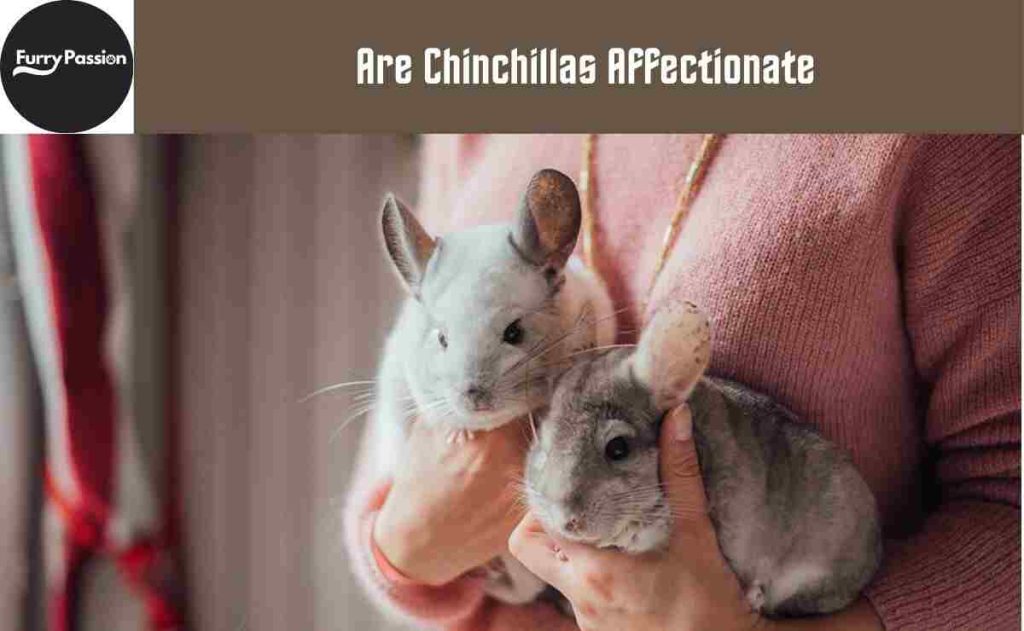When considering buying chinchillas as pets, you may wonder if they are affectionate. Yes, Chinchillas are affectionate and you can easily make good bonding with them.
Chinchillas can show attachment towards their human caretakers, but they have unique ways of expressing it. So at first experience, you may feel they are not affectionate enough. But that’s not entirely true. Keep reading to know chinchilla’s ways of showing love.
Are Chinchillas Affectionate?

Chinchillas are popular for their soft and luxurious fur and are often kept as pets. Products made from Chinchillas fur are very expensive. They are naturally social animals, so they enjoy interacting with their owners.
Chinchillas are very docile in nature and they don’t bite. Probably, many love them for these reasons. But you will be amazed that they are skittish too. So on your first meeting, they won’t contact you easily. If chinchillas perceive threats from you, they will avoid you.
However, chinchillas are prey animals by nature, so they can be more reserved and cautious than other pets. They may not crave constant physical affection like a dog or a cat. So you should respect their boundaries and allow them to approach you on their terms.
Furthermore, chinchillas don’t like being handled, cuddled, or picked up. So at first interaction, you should respect their nature and maintain the distance. Give them some space and gradually try to build the trust.
If your chinchillas constantly feel threatened by you, they will use their defense mechanisms like spraying and biting. At first, don’t bother them. Instead, give them time to adjust to your presence. Offer them treats and be patient. With time, they will eventually get used to your presence.
Building trust and forming a bond with a chinchilla takes time and patience. Spend quality time with your pet each day, it will provide an opportunity for them to come to you or explore their surroundings in a safe environment.
Over time, chinchillas will start bonding with you and show signs of affection. Once they will have trust in you, they will be very friendly like other pets.
How Do Chinchillas Show Affection?
While they may not be as affectionate as some other pets, chinchillas do have their own ways of showing affection. Here are seven common behaviors that indicate your chinchilla cares for you:
- Grooming
Chinchillas are meticulous groomers and will often groom themselves, their cage mates, and even their owners. If your chinchilla licks or nibbles on your fingers or hair, it’s a sign of affection. It seems weird to you. But it just gives you kisses.
- Cheek Rubs
Chinchillas have scent glands on their cheeks, and rubbing their cheeks against you or objects is a way for them to mark you as part of their territory. It’s a sign that they feel comfortable and secure around you.
- Snuggling
Chinchillas love to burrow and nestle into cozy spots. If your chinchilla climbs onto your shoulder or curls up in your lap, it means they trust you and enjoy your company.
- Purring
While chinchillas don’t purr like cats, they do make a soft, rhythmic sound when they’re content. Making purr like sound is a sign that they’re relaxed and happy in your presence.
- Playful behavior
Chinchillas are active and energetic animals, and if they engage in play behavior with you, such as chasing your hand or jumping onto your shoulder, it’s a sign that they enjoy spending time with you.
- Following you around
Chinchillas are naturally curious, and if they choose to follow you around the room, it means they want to be near you and are interested in what you’re doing.
- Binkying
It is a behavior unique to chinchillas where they jump, twist, and hop in the air in a display of pure joy. If your chinchilla binkies when they see you or while interacting with you, it’s a clear sign that they are happy and comfortable in your presence.
The Best Ways To Bond With Chinchillas
Building trust and fostering affection in chinchillas is crucial for a strong bond between you and your pet. They are naturally skittish and can take time to warm up to humans. However, with patience and the right approach, you can establish a trusting relationship with your chinchilla.
With consistency and gentle care, you can develop a strong bond of trust and affection with your chinchilla. So here are some tips:
- Ensure a Safe Environment
To build trust, start by creating a calm and safe environment for your chinchilla. Provide a spacious cage with appropriate bedding, hiding spots, and toys. This will help your pet feel secure and comfortable in its surroundings. Regularly clean the cage to maintain hygiene and reduce stress.
- Be Patience
Next, establish a routine and be consistent in your interactions with your chinchilla. Approach your pet calmly and avoid sudden movements or loud noises that may startle it. Speak gently and softly to convey a sense of safety and trustworthiness.
Be patient throughout the process. Building trust and fostering affection in chinchillas takes time, especially if they have had negative experiences in the past. Avoid forcing your chinchilla to interact with you if it shows signs of fear or distress. Respect its boundaries and give it time to adjust.
- Offer Treats
Offer treats as a positive reinforcement while handling your chinchilla. Gradually introduce your hand into the cage, leaving treats nearby. Allow your chinchilla to approach and take the treats at its own pace.
Over time, your pet will associate your hand with positive experiences and will become more comfortable being handled.
- Pet Them
Bonding time is crucial for building affection. Spend time near your chinchilla’s cage, reading or talking softly. This will allow your pet to become familiar with your presence and voice.
Slowly introduce gentle petting and scratching when your chinchilla seems relaxed and receptive. Focus on areas like the cheeks, back, and behind the ears, as these are areas they enjoy being touched.
Are Chinchillas Friendly to Other Pets?
Chinchillas are friendly and social animals, but introducing them to other pets requires careful consideration and management.
Chinchillas are prey animals by nature, which means they have certain instincts and behaviors that can impact their interactions with other pets. They are naturally cautious and may feel threatened or stressed in the presence of larger or more predatory animals.
When introducing a chinchilla to another pet, such as a cat or a dog, do so gradually and under controlled conditions. Start by allowing the animals to become accustomed to each other’s scents by exchanging bedding or using scent-marking techniques. This can help them establish familiarity and reduce the potential for aggression or fear.
Chinchillas are not suitable companions for other small pets, such as rabbits or guinea pigs. These animals may seem similar in size and behavior, but they have different social dynamics and may not get along well.
During these interactions, ensure that both animals feel safe and supported, and observe their body language and behavior. If any signs of aggression or stress are observed, immediate separation is necessary.
Conclusion
Chinchillas have the capacity for affection, but they express it in different ways. With patience, understanding, and consistent interaction, you can develop a loving and trusting relationship with your chinchilla.
Remember that every chinchilla is unique, and the ways they show affection may vary. So spend time observing your chinchilla’s behavior and understand their individual preferences to strengthen your bond and provide the best care.
